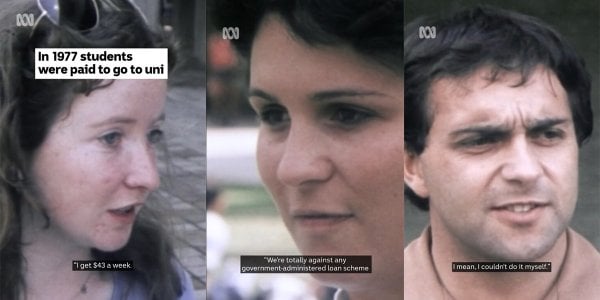Back to the future: 1970s video sparks time-travelling debate on financial struggles of today's youth
- Replies 20
The debate between generations about who had it tougher has been a long-standing one, often with older Australians reminiscing about the ‘good old days’ when life was simpler and, supposedly, more affordable.
However, a startling video from the 1970s has surfaced, challenging the narrative that young people today have it easier than their predecessors.
The footage, filmed in 1977, provided a stark comparison of living expenses and government support between then and now.
It featured a student on the Tertiary Education Assistance Scheme (TEAS)—a government support payment of the era—who managed to cover her weekly expenses with $43.
She allocated $14 for rent, $8 for food, and approximately $10 for bills, utilities, and transport. After expenses, she was left with only $8 to $10 per week, which sometimes had to cover university supplies like books or stationery.
Fast forward to today, and the picture is quite different for young Australians.

When adjusted for inflation, the TEAS payment the student received would be equivalent to $284.74 per week in today's money.
Her rent was a mere $92.71, food cost $53, and bills, including utilities and transport, came to $66.22, leaving her with $53 to $66 for other expenses or savings.
In contrast, the current AUSTUDY payment—which replaced the TEAS system in 1987—for a single student with no children is $319.50 per week.
If today's payment rate were applied in 1977, it would amount to nearly $48 per week. This might seem like an increase but doesn't stretch nearly as far given the soaring cost of living.
The level of government assistance appears to have remained consistent for nearly half a century; however, virtually everything else has undergone significant changes.
The median weekly rent in Australia now stands at a staggering $601, according to CoreLogic data.
Even with housemates to share the cost, it's a far cry from the $92.71 weekly rent of the 1970s.
According to Canstar Blue, groceries have also skyrocketed, with households spending around $160 per week—triple what the student from the video paid after adjusting for inflation.
Some individuals find groceries so costly that they resort to skipping meals or scavenging through dumpsters to make ends meet.
Perhaps the most significant change is the cost of education.
The video was captured from 1974 to 1989 when university education in Australia was free. Today, students grapple with HECS-HELP debts averaging around $26,000, with some facing loans exceeding $100,000—a debt many fear they'll never repay.
When asked about the impact of the reintroduction of university fees at the time, one student in 1977 responded, ‘I'd totally be at the mercy of the Department of Education…I couldn't do it myself.’
The reaction to the video on social media was one of disbelief and frustration. Some wished to have been born in the 1970s, longing for an era when they could afford their necessities, particularly with rent posing a significant challenge in their budgeting.
‘Amazing to see how far our quality of life has fallen,’ one commenter remarked.
‘I get $350 a week as a student and spend $200 on rent (in a house of 4 people), and groceries for one is at least $100 now. So I spent 85 per cent of my allowance compared to her $22/43 or 51 per cent, AND I have to pay $5,000 a semester for the privilege,’ another shared.
‘I'm sorry, did she say $14 on rent and then $8 on food…far out can we please please bring this back please,’ a third chimed.
Others argued that this should settle the debate once and for all regarding which generation faced greater challenges.
‘Their generation will continue to tell us they had it just as hard, if not harder, and that we are just lazy,’ one lamented.
‘Crazy to think this generation grew up to tell the ones that followed that they had it the hardest,’ another added.
The ongoing argument persists regarding which generation faced more challenges, as each era had its own set of difficulties.
The video was captured during a period of peak consumer price index (CPI) levels—which measures household inflation—spanning from the 1950s to the present day.
During the 1970s, the average annual CPI stood at 10.5 per cent, while recent data indicated a CPI of 3.6 per cent in the twelve months leading up to April 2024.
Regarding housing, Baby Boomers and Gen Xers often recall the 1990s, when interest rates soared to as high as 17 per cent.
However, in contrast, Gen Z and Millennials currently seeking to enter the property market in Sydney must earn a minimum of $293,578 annually to afford a home without experiencing mortgage stress.
Saranga Sudarshan, an analyst at Finder, outlined that younger Australians today experience significantly lower wages than older generations.
‘When incomes are adjusted for inflation, we find that Millennials and Gen Z have the worst inflation-adjusted average salaries—$91,493 and $97,156, respectively,’ he explained.
‘In today’s dollars, Baby Boomers and Gen X enjoyed incomes of $214,002 and $112,690, respectively. This is why, when adjusted for inflation, Gen Z, Millennials and Gen X are all paying 18 times their annual salary for a mortgage, compared to only seven times for Baby Boomers.’
You can watch the full video from 1977 here:
As the discussion around the financial challenges faced by young Australians gains traction, a recent video from the 1970s highlights the stark differences between generations.
This portrayal of the past prompted reflection on the economic landscape today and the strains felt by younger demographics.
Meanwhile, a study delved deeper into the generational divide, shedding light on which groups are bearing the brunt of financial stress.
These insights offer a comprehensive view of the evolving financial pressures faced by various age groups in Australia.
 What are your thoughts on this issue? How do you think we can bridge the gap between generations and work towards a fairer future for all Australians? Share your thoughts and experiences in the comments below.
What are your thoughts on this issue? How do you think we can bridge the gap between generations and work towards a fairer future for all Australians? Share your thoughts and experiences in the comments below.
However, a startling video from the 1970s has surfaced, challenging the narrative that young people today have it easier than their predecessors.
The footage, filmed in 1977, provided a stark comparison of living expenses and government support between then and now.
It featured a student on the Tertiary Education Assistance Scheme (TEAS)—a government support payment of the era—who managed to cover her weekly expenses with $43.
She allocated $14 for rent, $8 for food, and approximately $10 for bills, utilities, and transport. After expenses, she was left with only $8 to $10 per week, which sometimes had to cover university supplies like books or stationery.
Fast forward to today, and the picture is quite different for young Australians.

A 1977 video showcased the stark financial contrasts between students then and now, revealing substantially lower costs for rent, food, and university fees. Credits: Tiktok / ABC News Australia
When adjusted for inflation, the TEAS payment the student received would be equivalent to $284.74 per week in today's money.
Her rent was a mere $92.71, food cost $53, and bills, including utilities and transport, came to $66.22, leaving her with $53 to $66 for other expenses or savings.
In contrast, the current AUSTUDY payment—which replaced the TEAS system in 1987—for a single student with no children is $319.50 per week.
If today's payment rate were applied in 1977, it would amount to nearly $48 per week. This might seem like an increase but doesn't stretch nearly as far given the soaring cost of living.
The level of government assistance appears to have remained consistent for nearly half a century; however, virtually everything else has undergone significant changes.
The median weekly rent in Australia now stands at a staggering $601, according to CoreLogic data.
Even with housemates to share the cost, it's a far cry from the $92.71 weekly rent of the 1970s.
According to Canstar Blue, groceries have also skyrocketed, with households spending around $160 per week—triple what the student from the video paid after adjusting for inflation.
Some individuals find groceries so costly that they resort to skipping meals or scavenging through dumpsters to make ends meet.
Perhaps the most significant change is the cost of education.
The video was captured from 1974 to 1989 when university education in Australia was free. Today, students grapple with HECS-HELP debts averaging around $26,000, with some facing loans exceeding $100,000—a debt many fear they'll never repay.
When asked about the impact of the reintroduction of university fees at the time, one student in 1977 responded, ‘I'd totally be at the mercy of the Department of Education…I couldn't do it myself.’
The reaction to the video on social media was one of disbelief and frustration. Some wished to have been born in the 1970s, longing for an era when they could afford their necessities, particularly with rent posing a significant challenge in their budgeting.
‘Amazing to see how far our quality of life has fallen,’ one commenter remarked.
‘I get $350 a week as a student and spend $200 on rent (in a house of 4 people), and groceries for one is at least $100 now. So I spent 85 per cent of my allowance compared to her $22/43 or 51 per cent, AND I have to pay $5,000 a semester for the privilege,’ another shared.
‘I'm sorry, did she say $14 on rent and then $8 on food…far out can we please please bring this back please,’ a third chimed.
Others argued that this should settle the debate once and for all regarding which generation faced greater challenges.
‘Their generation will continue to tell us they had it just as hard, if not harder, and that we are just lazy,’ one lamented.
‘Crazy to think this generation grew up to tell the ones that followed that they had it the hardest,’ another added.
The ongoing argument persists regarding which generation faced more challenges, as each era had its own set of difficulties.
The video was captured during a period of peak consumer price index (CPI) levels—which measures household inflation—spanning from the 1950s to the present day.
During the 1970s, the average annual CPI stood at 10.5 per cent, while recent data indicated a CPI of 3.6 per cent in the twelve months leading up to April 2024.
Regarding housing, Baby Boomers and Gen Xers often recall the 1990s, when interest rates soared to as high as 17 per cent.
However, in contrast, Gen Z and Millennials currently seeking to enter the property market in Sydney must earn a minimum of $293,578 annually to afford a home without experiencing mortgage stress.
Saranga Sudarshan, an analyst at Finder, outlined that younger Australians today experience significantly lower wages than older generations.
‘When incomes are adjusted for inflation, we find that Millennials and Gen Z have the worst inflation-adjusted average salaries—$91,493 and $97,156, respectively,’ he explained.
‘In today’s dollars, Baby Boomers and Gen X enjoyed incomes of $214,002 and $112,690, respectively. This is why, when adjusted for inflation, Gen Z, Millennials and Gen X are all paying 18 times their annual salary for a mortgage, compared to only seven times for Baby Boomers.’
You can watch the full video from 1977 here:
As the discussion around the financial challenges faced by young Australians gains traction, a recent video from the 1970s highlights the stark differences between generations.
This portrayal of the past prompted reflection on the economic landscape today and the strains felt by younger demographics.
Meanwhile, a study delved deeper into the generational divide, shedding light on which groups are bearing the brunt of financial stress.
These insights offer a comprehensive view of the evolving financial pressures faced by various age groups in Australia.
Key Takeaways
- A video from 1977 highlighted the financial differences experienced by students then compared to today, showing significantly lower expenses for rent, food, and university fees.
- Government support payments like the TEAS in the past and AUSTUDY today have remained almost the same when adjusted for inflation, while costs of living have increased dramatically.
- Australians reacted with astonishment to the low living costs in the 1970s, especially regarding free university education and the small portion of income spent on rent and food.
- Analysis by experts suggested that Millennials and Gen Z have it tougher in terms of inflation-adjusted salaries compared to previous generations, impacting their ability to afford housing and manage expenses without financial stress.







